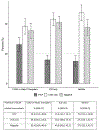Rare Variant Genetics and Dilated Cardiomyopathy Severity: The DCM Precision Medicine Study
- PMID: 37641966
- PMCID: PMC10530109
- DOI: 10.1161/CIRCULATIONAHA.123.064847
Rare Variant Genetics and Dilated Cardiomyopathy Severity: The DCM Precision Medicine Study
Abstract
Background: Dilated cardiomyopathy (DCM) can lead to advanced disease, defined herein as necessitating a durable left ventricular assist device or a heart transplant (LVAD/HT). DCM is known to have a genetic basis, but the association of rare variant genetics with advanced DCM has not been studied.
Methods: We analyzed clinical and genetic sequence data from patients enrolled between 2016 and 2021 in the US multisite DCM Precision Medicine Study, which was a geographically diverse, multiracial, multiethnic cohort. Clinical evaluation included standardized patient interview and medical record query forms. DCM severity was classified into 3 groups: patients with advanced disease with LVAD/HT; patients with an implantable cardioverter defibrillator (ICD) only; or patients with no ICD or LVAD/HT. Rare variants in 36 DCM genes were classified as pathogenic or likely pathogenic or variants of uncertain significance. Confounding factors we considered included demographic characteristics, lifestyle factors, access to care, DCM duration, and comorbidities. Crude and adjusted associations between DCM severity and rare variant genetic findings were assessed using multinomial models with generalized logit link.
Results: Patients' mean (SD) age was 51.9 (13.6) years; 42% were of African ancestry, 56% were of European ancestry, and 44% were female. Of 1198 patients, 347 had LVAD/HT, 511 had an ICD, and 340 had no LVAD/HT or ICD. The percentage of patients with pathogenic or likely pathogenic variants was 26.2%, 15.9%, and 15.0% for those with LVAD/HT, ICD only, or neither, respectively. After controlling for sociodemographic characteristics and comorbidities, patients with DCM with LVAD/HT were more likely than those without LVAD/HT or ICD to have DCM-related pathogenic or likely pathogenic rare variants (odds ratio, 2.3 [95% CI, 1.5-3.6]). The association did not differ by ancestry. Rare variant genetic findings were similar between patients with DCM with an ICD and those without LVAD/HT or ICD.
Conclusions: Advanced DCM was associated with higher odds of rare variants in DCM genes adjudicated as pathogenic or likely pathogenic, compared with individuals with less severe DCM. This finding may help assess the risk of outcomes in management of patients with DCM and their at-risk family members.
Registration: URL: https://www.
Clinicaltrials: gov; Unique identifier: NCT03037632.
Keywords: cardiomyopathy, dilated; genetics; risk.
Conflict of interest statement
Figures


References
-
- Njoroge JN, Mangena JC, Aribeana C, Parikh VN. Emerging Genotype-Phenotype Associations in Dilated Cardiomyopathy. Curr Cardiol Rep 2022;24:1077–1084. - PubMed
-
- Klauke B, Gaertner-Rommel A, Schulz U, Kassner A, Zu Knyphausen E, Laser T, Kececioglu D, Paluszkiewicz L, Blanz U, Sandica E, et al. High proportion of genetic cases in patients with advanced cardiomyopathy including a novel homozygous Plakophilin 2-gene mutation. PLoS One 2017;12:e0189489. - PMC - PubMed
-
- Cuenca S, Ruiz-Cano MJ, Gimeno-Blanes JR, Jurado A, Salas C, Gomez-Diaz I, Padron-Barthe L, Grillo JJ, Vilches C, Segovia J, et al. Genetic basis of familial dilated cardiomyopathy patients undergoing heart transplantation. J Heart Lung Transplant 2016;35:625–35. - PubMed
-
- Martins E, Sousa A, Canedo P, Leite S, Pinto R, Campelo M, Amorim S, Moura B, Lopes JM, Machado JC, et al. Genetic variants identified by target next-generation sequencing in heart transplant patients with dilated cardiomyopathy. Rev Port Cardiol (Engl Ed) 2019;38:441–447. - PubMed

